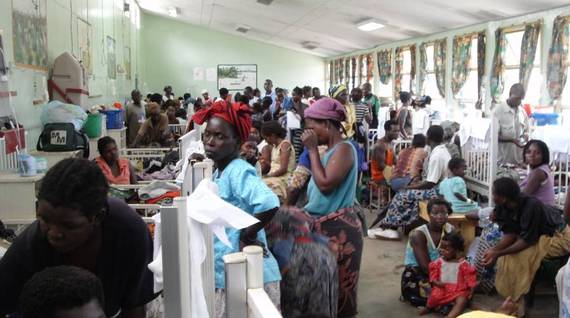The Kamuzu Central Hospital stands tall on a hill in the center of Lilongwe, the capital city of the southern African country Malawi. The largest of the tertiary health centers in the country, Kamuzu Central Hospital sees the widest variety of patients from the widest variety of communities. Primary health centers in the small rural communities send their more complicated cases to the larger, more comprehensive secondary health centers. Likewise, those cases too complicated for the secondary health centers must travel to the urban tertiary centers for treatment--and Kamuzu is the largest, most able of these. As a result, the health workers at this hospital care for the longest and the toughest cases in the country, many lasting weeks or months. Some are completely untreatable--the limitations of healthcare in a developing country eventually can take precedence over all else.
Every evening after working at the hospital, I would go for a run. And I would run as far as I could, out of the grounds of the hospital, through the city streets packed with Malawian onlookers curiously inquiring as to the purpose of a white "Mzungu" running apparently from nothing. I would explore the city. I was limited only by the brilliant fiery red setting sun and the oncoming darkness. And so every evening, as the sun set around 5:30pm- and the sky opened up in temporary warmth before sheltering the sun for the night-- I would return to the central gates of Kamuzu Central Hospital.
Oftentimes, those runs were for pleasure. Oftentimes, those runs were for exercise or adventure. But many times, those runs were to clear my head. They were to get away from the hospital.
Because work at that hospital was tough and frustrating and saddening, and running away--even for a short time-- sometimes felt to me the most effective solution. The main ward of the hospital was an overwhelming place for a 21 year old college student. It was a place where many lives are saved everyday--and a place where many lives could not be saved. It was a place of many highs and many lows. It was a place where patients walked the halls carrying the burdens of diseases and ailments, ones for which they could be cured here in the United States. But here, in the largest tertiary healthcare center within the country, only so much could be done.
As I came back from my run every evening, I would have to walk past the family ward. Many of the long term patients on the main ward would live there for months--and their families would live with them. And they would live on the floors of the family ward. During the days, they would visit their family members on the ward, bringing them clothing and blankets and food. On the poorer of days, they would bear the bad news of their weakening loved one, and they would endure together. On the worst of days, they would cry. And I would hear. And I would feel helpless. I worked in a hospital--a place of healing; and yet, our work often was futile, unsuccessful from the beginning. The doctors would work diligently and tirelessly, but many of the cancers and the diseases and the illnesses brought to Kamuzu Central Hospital were destined to win.
However, in the evenings, I would walk past as families would prepare for the night--fires would light up the outdoor benches as water was boiled and Nsima was cooked. And every evening as I walked past, something magical would happen. Before the families sat down for dinner, they all would stand together--arms often held as they gathered in a large circle--and they would sing.
A beautiful, harmonious chorus would erupt from the crowd. Sometimes one woman would begin, and the rest would follow; other times, the group would begin synchronously, as they together felt it coming. For a few minutes, the clapping hands and the warm voices took over the grounds of the hospital. I would stop and listen, and I would watch as these families found solidarity in each other. Temporarily, we all bound together through the power of the music. I could not understand the Chichewa words sung proudly and fearlessly, but I could feel it in the strength of their voices--they were fighting. Together.
On days with the best of news, on days with the worst--on days with no news whatsoever--these families would end the evening by standing together and singing. They would end these long days with hands held, with the strength of camaraderie powering their voices. And with a few minutes of raw beauty. They would raise the spirits of the defeated, comfort the souls of the overcome. And after the voices dissipated into silence, the families would continue to their dinners and would prepare for bed along the halls of the open air ward. They would prepare for another day of faith and perseverance.
I would walk away from these brief encounters feeling warm. I knew that they could not change the circumstances of the hospital, of these families, or of their loved ones. But in their steadfast songs, in their comforting of each other, they likewise could revive my spirit to fight and to keep fighting, and their fight reminded me of my thankfulness that I was in such a position to continue the fight.
And sometimes, the comfort of a warm song and a held hand are all it takes to remind us of the contributions we can make when we fight. They can remind us of the strength of faith and the power of souls intertwined by united endeavors. They keep us thankful that we allow our souls to intertwine with others, to feel their passions, and to unite over their strength.
